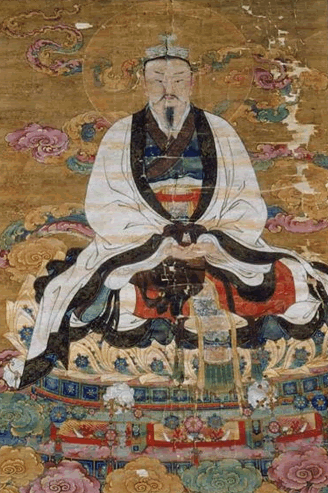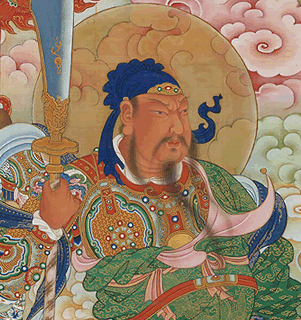The Jade Emperor & Other Gods of the Earthly Domain
According to Chinese popular religion, there are three domains in the cosmos — Heaven, Earth, and the Underworld — and each domain is populated by a host of important gods and goddesses. The Heavenly Domain is ruled by the Jade Emperor, who presides over a court of important deities who are worshipped throughout China. Human beings who have lived exemplary lives can enter this domain after death by crossing the “the silver bridge” and being reborn as gods.
THE JADE EMPEROR AND THE BUREAUCRACY OF HEAVEN*
The Jade Emperor (Yuhuang or Yudi) was considered to be the ruler of Heaven. He was thought to be like a human emperor, in that he ruled over a heavenly court populated by all the important gods of China.
For many years it has been a truism that the Chinese conception of gods is based on the Chinese bureaucracy, and that the social organization of the human government is the essential model that Chinese people use when imagining the gods. At the apex of the divine bureaucracy stands the Jade Emperor in Heaven, corresponding to the human Son of Heaven (Tianzi, another name for emperor) who rules over Earth. The Jade Emperor is in charge of an administration divided into bureaus, and each bureaucrat-god takes responsibility for a clearly defined domain or discrete function.
The local officials of the celestial administration are the Gods of Walls and Moats (also called the City Gods), one per locality, and below them are the Gods of the Hearth (also called the Stove or Kitchen gods), one per family, who generate a never-ending flow of reports on the people under their jurisdiction. They are assisted in turn by gods believed to dwell inside each person’s body, who accompany people through life and into death, carrying with them the records of good and evil deeds committed by their charges. The very lowest officers (also known as the ten Magistrates of Hell) are those who administer punishment to deceased spirits passing through the purgatorial chambers of the Underworld. They too have reports to fill out, citizens to keep track of, and jails to manage
Bureaucratic logic is also a striking part of Chinese iconography, temple architecture, and ritual structure. For peasants who could not read in traditional times, the bureaucratic nature of the gods was an apodictic matter of appearance: gods were dressed as government officials. Their temples are laid out like imperial palaces, which include audience halls where one approaches the god with the proper deportment. Many rituals involving the gods follow bureaucratic procedures. Just as one communicates with a government official through his staff, utilizing proper written forms, so too common people depend on literate scribes to write out their prayers, in the correct literary form, which are often communicated to the other world by fire.
It is important to note, however, that recent scholarship has begun to criticize the generalization that most Chinese gods are bureaucratic, raising questions about the way in which the relation between the human realm and the divine realm should be conceptualized. Should the two realms be viewed as two essentially different orders, with one taking priority over the other? Should the two bureaucracies be seen as an expression in two spheres of a more unitary conceptualization of power? Is the attempt to separate a presumably concrete social system from an allegedly idealized projection wrong in the first place? Other studies suggest that some of the more significant deities of Chinese religion are not approached in bureaucratic terms at all.
GODS AT THE JADE EMPEROR’S COURT: MAZU AND GUAN YU
The gods at the Court of the Jade Emperor were important deities who were worshipped throughout China. For example, every village had a village temple where many gods were worshipped, including one major god who was the protector or patron of that village. Different gods and goddesses were worshipped from village to village, but it was understood that all these gods actually resided in Heaven, at the Court of the Jade Emperor.
Important gods at the Jade Emperor’s Court included Mazu (or Tian Hou, “Empress of Heaven”), who was associated with the sea and thought to be a protector of fishermen, and Guan Yu (or Guandi, “Emperor Guan”), who was linked to warfare and military valor. Both Mazu and Guan Yu were believed to have been mortals who had led exemplary lives and became gods after death. Mazu is said to have been an exceptional young woman named Lin Moniang who lived during the 10th century; Guan Yu was a famous warrior of the late Han dynasty (206 BCE-220 CE).
APPEASING THE GODS
Ordinary people treated most gods with a mixture of awe and an interest in negotiation. The gods were prayed to and worshipped, but they could also be bribed and appeased with offerings and gifts. The gods sometimes left Heaven to visit the Earthly Domain, and though they were not supremely powerful, they did have the power to help and hurt people in the Earthly Domain. The gods also had their foibles and could be capricious and get angry. One had to take care to not agitate the gods and work hard to remain on their “good side.”
BECOMING A GOD
In theory human beings who had led exemplary lives had a chance to become gods in the afterlife. After being escorted to the Underworld by the local City God and standing in judgment before one of the ten Magistrates of Hell, an exemplary soul could be released from the Underworld and choose to cross the Silver Bridge into Heaven, which would mean that he or she would be reborn as a god. It was generally understood, however, that very few people ever had the opportunity to leave the Underworld this way.

